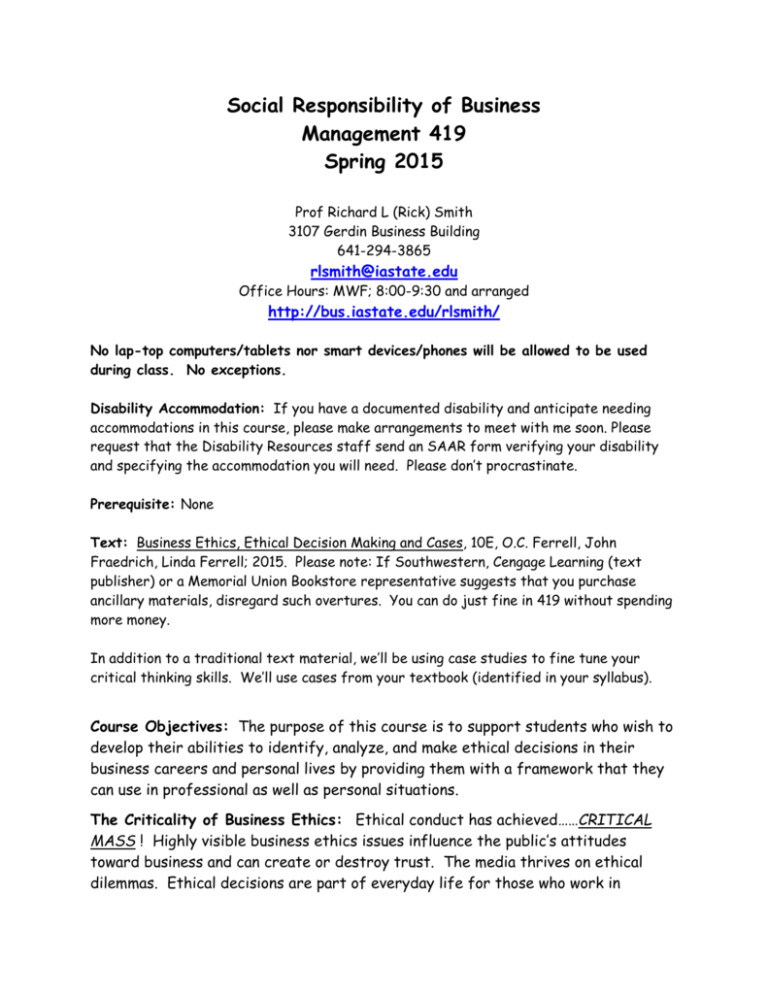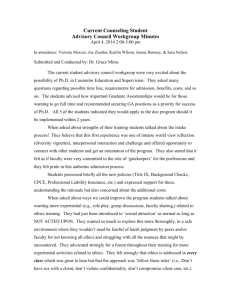Syllabus
advertisement

Social Responsibility of Business Management 419 Spring 2015 Prof Richard L (Rick) Smith 3107 Gerdin Business Building 641-294-3865 rlsmith@iastate.edu Office Hours: MWF; 8:00-9:30 and arranged http://bus.iastate.edu/rlsmith/ No lap-top computers/tablets nor smart devices/phones will be allowed to be used during class. No exceptions. Disability Accommodation: If you have a documented disability and anticipate needing accommodations in this course, please make arrangements to meet with me soon. Please request that the Disability Resources staff send an SAAR form verifying your disability and specifying the accommodation you will need. Please don’t procrastinate. Prerequisite: None Text: Business Ethics, Ethical Decision Making and Cases, 10E, O.C. Ferrell, John Fraedrich, Linda Ferrell; 2015. Please note: If Southwestern, Cengage Learning (text publisher) or a Memorial Union Bookstore representative suggests that you purchase ancillary materials, disregard such overtures. You can do just fine in 419 without spending more money. In addition to a traditional text material, we’ll be using case studies to fine tune your critical thinking skills. We’ll use cases from your textbook (identified in your syllabus). Course Objectives: The purpose of this course is to support students who wish to develop their abilities to identify, analyze, and make ethical decisions in their business careers and personal lives by providing them with a framework that they can use in professional as well as personal situations. The Criticality of Business Ethics: Ethical conduct has achieved……CRITICAL MASS ! Highly visible business ethics issues influence the public’s attitudes toward business and can create or destroy trust. The media thrives on ethical dilemmas. Ethical decisions are part of everyday life for those who work in organizations. Ethics is a component of decision making at all levels of organizational culture. Ethics are not just isolated personal issues. Policies and informal communications for responsible conduct are embedded in an organization’s operations. This means that both ethical and unethical conduct are the province of everyone who works within an organizational context and/or environment. Course Description and Objectives: The current University Catalog describes Management 419 as “a consideration of the role of business in society which encompasses a critical analysis of ethical, managerial, and public issues as they affect the corporation.” Outcomes: Successful completion of Management 419 will equip students to develop an awareness of individual values and ethics are prerequisites in this endeavor. We’re going to focus on responsibilities and ethics. By studying business ethics, students begin to recognize and develop coping skills to cope with conflicts between their personal values and those of an organization. Grading: There will be three exams during the semester plus a final examination. All exams will be essay-exams with the student’s score depending on how well he/she applies course material to “relevant” points. There is a definite “application” spin to Mgmt 419. Scores will also be impacted by how well students write (grammar, structure, and organization). Responses to exam questions should demonstrate solid critical thinking. The final exam will be comprehensive. Available point summary: Exam I Exam II Exam III Final Exam Total 60 pts 60 pts 60 pts 100 pts 280 pts February 3 February 24 March 31 May 9, 9:45 AM In order to encourage students to come to class prepared to discuss assigned materials, your instructor will utilize unannounced short-answer quizzes. The class format includes extensive open discussion opportunities of cases, articles, and lecture topics. Students will also be expected to do an individual classroom presentation (adequate notice will be given). Note that this is “an individual” task; not as part of a team effort. Your instructor reserves the right to make changes to this syllabus or any courserelated document/schedule he deems necessary to correct or update for whatever reason. There will be neither make-up exams nor extra-credit available. Grading (+/- grading will be used. Percentages will be rounded to a whole number. No decimals): A AB+ B BC+ >92% >90% - <92% >88% - <90% >82% - <88% >80% - <82% >78% - <80% C CD+ D DF >72% - <78% >70% - <72% >68% - <70% >62% - <68% >60% - <62% <60% The following is a tentative schedule and is subject to change. It is rigorous but doable. Week of: January 12 Chapter 1 Topic(s): The Benefits of Business Ethics A Guide to Case Analysis Web-Page January 19 Stakeholders Relationships & Responsibility and Corporate Governance Chapter 2 Case 10: Home Depot Implements Stakeholder Orientation January 26 Chapter 2 Corporate Governance Provides Responsibility February 2 Exam I; February 2 Emerging Business Ethics Issues Chapter 3 Case 14: Apple’s Ethical Success and Challenges February 9 Chapter 3 Emerging Business Ethics Issues (Cont) Case 4: Sustainability Challenges in the Oil Industry….. RLS February 16 The Institutional of Business Ethics February 23 Exam II; February 23 Ethical Decision Making Chapter 5 March 2 Chapter 5 Ethical Decision Making (Cont) March 9 Chapter 6 Individual Factors: Moral Philosophies and Values March 16 Spring Break March 23 Chapter 7 The Role of Corporate Culture in Ethical Decision Making Case 15; PepsiCo’s Journey Toward an Ethical Culture March 30 Exam III; March 30 Developing an Effective Ethics Program Chapter 8 April 6 Developing an Effective Ethics Program (Cont) Chapter 8 April 13 Chapter 9 April 20 Chapter 10 Managing and Controlling Ethics Programs Globalization of Ethical Decision Making April 27 (Dead Week) Sustainability: Ethical and Social Responsibilities Chapter 12 Loose Ends May 6 Final Exam, 2:15 PM Chapter 4







